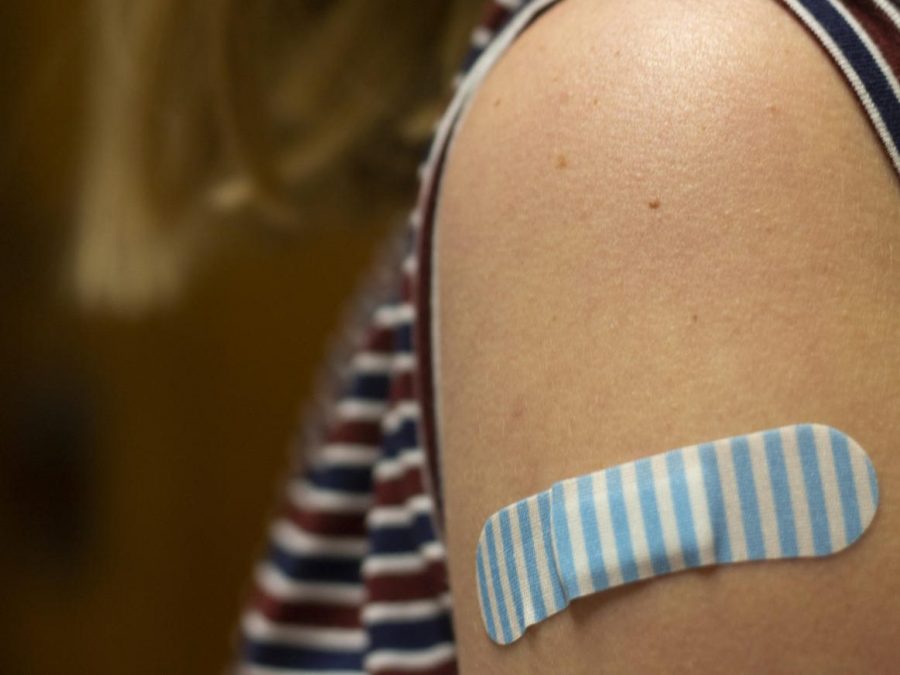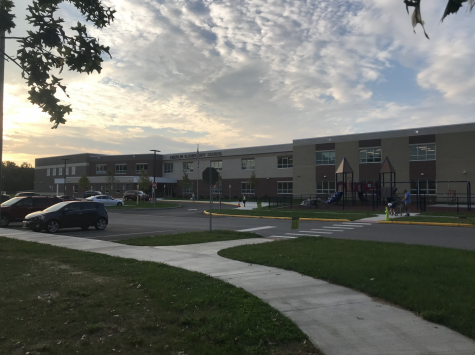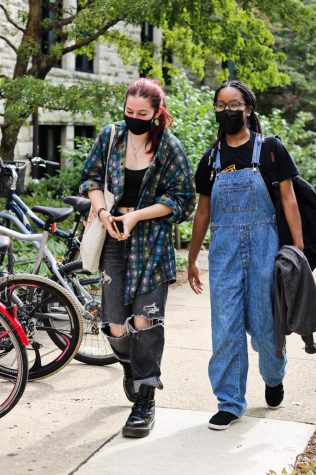College Announces New Indoor Mask Mandate, Vaccination Policy
The College will require students to be vaccinated within 45 days of the FDA granting full vaccine approval.
On Monday, the College reinstated a mask mandate for both vaccinated and unvaccinated individuals when indoors, unless they are in their homes or offices with the door closed. The College also released an announcement today, requiring students to be fully vaccinated within 45 days of the Federal Drug Administration’s vaccine approval after its initial Emergency Use Authorization. The College says that its decisions are informed by new guidance from the Centers for Disease Control and Prevention, including the recommendation that vaccinated individuals continue to wear masks indoors in areas with high rates of COVID-19 transmission, which now includes Lorain County.
An FAQ provided by the College stated that classes in the 2021–2022 academic year will remain fully in-person. It also clarified that housing will proceed with full occupancy in all residence halls; that indoor dining options will continue with increased distancing and ventilation; and that unvaccinated individuals will be required to receive approval from the Division of Student Life prior to traveling beyond the greater Cleveland area, and will undergo mandatory testing upon their return.
According to Campus Health Coordinator Katie Gravens, the new mask mandate will stay in place as long as Lorain County remains a high-transmission area.
“When Lorain County is no longer an area of high transmission — so if Lorain County drops to moderate for an extended period — we are likely to remove the indoor mask mandate for vaccinated people because that’s the guidance,” Gravens said.
In her email announcing the new masking policy, President Carmen Twillie Ambar highlighted that the second- and third-years on campus this summer have achieved a 93 percent vaccination rate, with a 81.5 percent vaccination rate among faculty and staff. Overall, the campus-wide vaccination rate currently stands at 86.9 percent.
According to Lorain County Health Commissioner Dave Covell, the College’s high vaccination rate serves as a strong shield from COVID-19 transmission, even with the virulent Delta variant.
“Oberlin College has had such a great vaccination rate [and] that really helps with the spread,” Covell said. “It’s all about vaccination. The more we can do to vaccinate folks, the better off the College will be … in the fall, in terms of masking.”
However, with the rising COVID-19 case count in Lorain County, Covell explained that universal masking is a wise precaution to limit transmission until the wave of new cases declines.
“The idea of more universal masking for a little while — while we’re in this wave — should last between four and five weeks,” Covell said. “That’s what happened in Europe and now cases are plummeting in the U.K. right now. That’s probably the timeframe — the end of August [or] maybe the beginning of September. Then we’ll be completely out of the wave and right back to where we were, where we have a low case count.”
He also highlighted that these waves will likely continue into the fall.
“I would assume [another wave] may happen again in November, because again, that’s what the models show of how this happens,” Covell said. “The idea is: the more people you have vaccinated, the less impact the wave has. As this comes through, we’re starting to have a high case count, but our hospitalization rates are almost zero for vaccinated people.”
College second-year Ariana Leandry, who is both immunocompromised and disabled, was grateful to see the mask mandate return to the College, although she emphasized that she feels this measure is not entirely sufficient.
“Seeing that mask mandate did make me feel a lot better,” Leandry said. “Honestly, I was waiting for that. I was starting to get concerned on whether or not campus was going to start taking these rising [transmission rates] seriously or not. But also, along with the mask mandate, I strongly believe that campus should have offered accessible testing — which I’m still waiting for, unfortunately. I know that a lot of people have to go off campus for testing and that’s just very inaccessible for people that don’t have rides.”
According to Gravens, the College is following CDC guidance that recommends testing for individuals who are symptomatic, or who have been exposed to COVID-19. The College provides testing for symptomatic individuals at Student Health. So far, no one has tested positive for COVID-19 on campus this summer.
“All summer students who have been symptomatic have gone to student health to be tested,” Gravens said. “We have not one positive COVID-19 case. That’s the data that we know today and we’ll continue to monitor that.”
Still, Gravens said that students should maintain a high degree of caution, including adhering to the original ObieSafe Community Agreement students signed prior to returning to campus for the 2020–2021 academic year.
“Everyone signed a community agreement for the 2020–21 academic year, and we’re still in that year,” Gravens said. “There will be a new [agreement] for next year. We do expect people to comply with the masking requirement whenever they’re indoors. When you’re with the people that you would live with, we don’t expect that. But if you have other people come in, everyone should be masked.”
According to Gravens, a modified version of the Community Agreement will be available soon, and will include a section on the College’s new vaccine requirement.
The College’s announcements also come after the College-sponsored Solstice event last weekend. Renewed conversation over mask-wearing recently surged in Oberlin’s social media circles after Solstice last weekend, where a handful of students in attendance had been to the Lollapalooza music festival in Chicago the same weekend. However, the College maintains that the mask guidance had nothing to do with the event. In her email announcement, President Ambar clarified that there is no evidence of exposure to COVID-19 at Solstice last weekend.
“Over the weekend, the College sponsored an indoor event called Solstice that attracted some students who also may have attended Lollapalooza in Chicago,” President Ambar wrote. “There is no evidence that attendees at either event are at increased risk, as there was no confirmation of exposure.”
Gravens further emphasized that the new mask mandate is unrelated to Solstice.
“We follow the guidance and the data,” Gravens said. “[The mandate] has nothing to do with the situation that occurred over the weekend. We just put both of those things in one email.”
Still, Leandry reported that many students have been minimizing the impact of COVID-19 on immunocompromised communities.
“As an immunocompromised student, to see people joke about what happened with Lollapalooza and Solstice, [and] the fact that it’s not that big of a deal to a lot of people … really feels like my classmates don’t care if I live or die, and like they don’t care if my friends who are disabled live or die,” Leandry said. “It’s just very, very much changed the way that I navigate campus and engage with campus events.”
According to Covell, if an outbreak of COVID-19 occurs at the College, quarantine measures should be instituted — yet the chances of such an outbreak are slim.
“If you’re eating in the cafeteria with five other vaccinated students, the chances of one of the breakthrough [cases] giving that breakthrough to another person and them getting a breakthrough — you start to do the math on that, and it’s really unlikely,” Covell said. “Masking where you’re in a tight spot makes sense, but again, for vaccinated folks, the risk is pretty low. If a student is vaccinated, they can be very confident that even if they were to become a breakthrough case, it’s going to be mild.”
Consistent with Covell’s assessment, indoor dining will remain open despite the mask mandate.
“What we have decided with dining is that grab-and-go options will remain available,” Gravens said. “However, in the dining halls, we plan to reduce occupancy and to have distance between the tables. So students will wear their mask — except when they’re eating their meals. We don’t want to totally go back to where we were last year, because this is a very different situation. We’re trying to minimize risks of transmission, but still allow students to dine in.”
Given the importance of vaccination to reduce transmission, Covell emphasized the local vaccination resources.
“This is becoming a disease of the unvaccinated,” Covell said. “It’s unfortunate, but some folks still are not getting vaccinated. We’ve got plenty of opportunity [for vaccination] — we’re happy to vaccinate anybody that wants to — all you’ve got to do is contact us.”
Gravens also said that the College will facilitate students’ vaccination, based on the degree of need students demonstrate in the required vaccine intent form.
“We will look at how many students need to be vaccinated through the vaccine intent form,” Gravens said. “One of the questions is, ‘I have not received the vaccine, but I’m interested,’ or ‘I’m in process and I need dose two.’ We are able, then, to identify how many students that will be and we will be able to facilitate vaccination.”
Chief of Staff David Hertz also emphasized that, despite the new policies, there will likely not be a return to the stringent regulations of the fall and spring semesters.
“We’ve given this a lot of thought,” Hertz said. “We’ve been monitoring trends with the Delta variant. … It’s important to note that this is not a return to last year. This will not be life as it was in the previous academic year. We will not be de-densifying. We will have a normal student population — actually a little higher student population than a normal year. We will have athletics. We will have in-building dining. Unless there’s some dramatic change, that is our intention, thanks to vaccinations. We have that tool that we didn’t have last year.”
Symptomatic individuals should contact Student Health at (440) 775-8180 or [email protected]. Unvaccinated individuals can find vaccine resources here.








